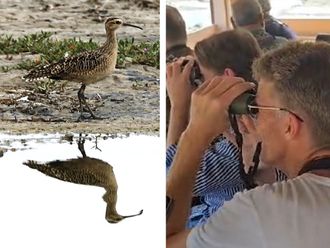Dubai: Camping, barbecuing and dog walking have been banned in the surroundings of Al Qudra Lake, a popular picnic destination in Dubai, according to new signboards put up by Dubai Municipality.
The Environment Department of the civic body has installed signboards banning several activities that would affect the environment as well as the birds, animals and fish in the natural reserve.
They include hunting or killing wildlife, bonfires, camping, dog walking, swimming, fishing, cutting or removing plants, entry of vehicles, or motorcycles, barbecuing and cooking and feeding the animals.
Legal action will be taken against violators engaged in prohibited practices and those not following the environmental and safety instructions, said the new signboards which carried the location as Al Marmoum Conservation Reserve.
Separate signboards put up by the Waste Management Department have warned visitors of Dh500 fines for leaving waste in the desert areas and for kindling fire in public places.
Officials from the two departments did not immediately respond to questions from Gulf News.
The series of lakes in Al Qudra fall under the Al Marmoum Conservation Reserve, one of Dubai’s biggest protected areas, covering around nine per cent of the total land area of the emirate.
Stretching 361.95 hectares, the reserve is classified as category II (National Park) under the International Union for Conservation of Nature (IUCN) Protected Area Category. It is home to hundreds of species of birds and dozens of reptiles, mammals and flora, with a few of them named in the IUCN Red list.
Dr Reza Khan, principal wildlife specialist at Dubai Safari and Dubai Municipality, welcomed the restrictions put on visitors to the area.
“The government has planted hundreds of trees and developed the lakes for preserving the environment and for the betterment of the birds and animals,” he told Gulf News on Monday.
“This place was never meant to be a picnic area or dog walking site. But, because they were not prevented, people just started coming in and camping here and walking their dogs,” Dr Khan pointed out.
The trash left behind by several people and incidents of dogs attacking birds had marred the wildlife reserve. Some people fed unsafe things to birds and fish, resulting in their deaths as well.
Dr Khan said the risk of a fire accident always loomed large as many visitors lit campfires and made barbecues.
“It is not an area guarded for 24 hours. It would be difficult to put down if there is a fire accident.”












